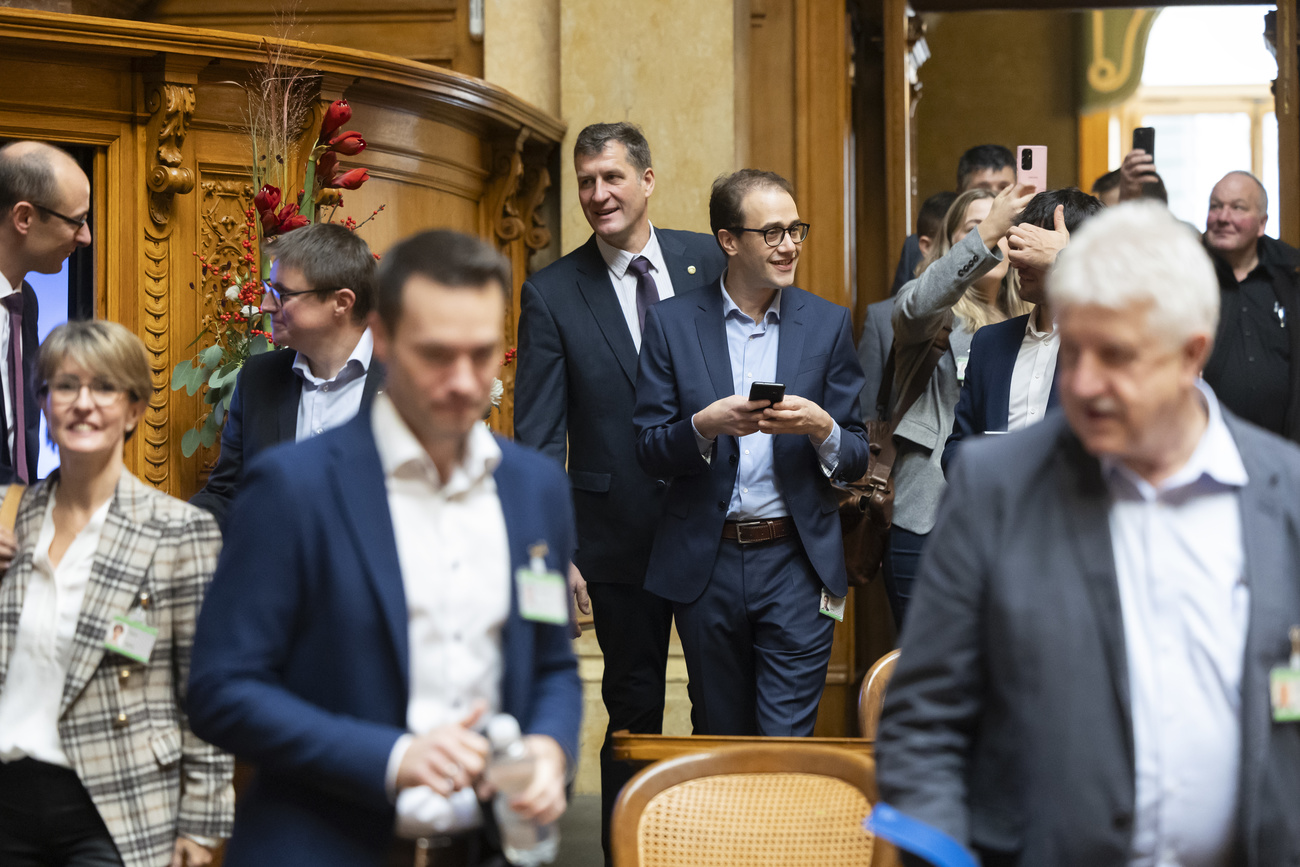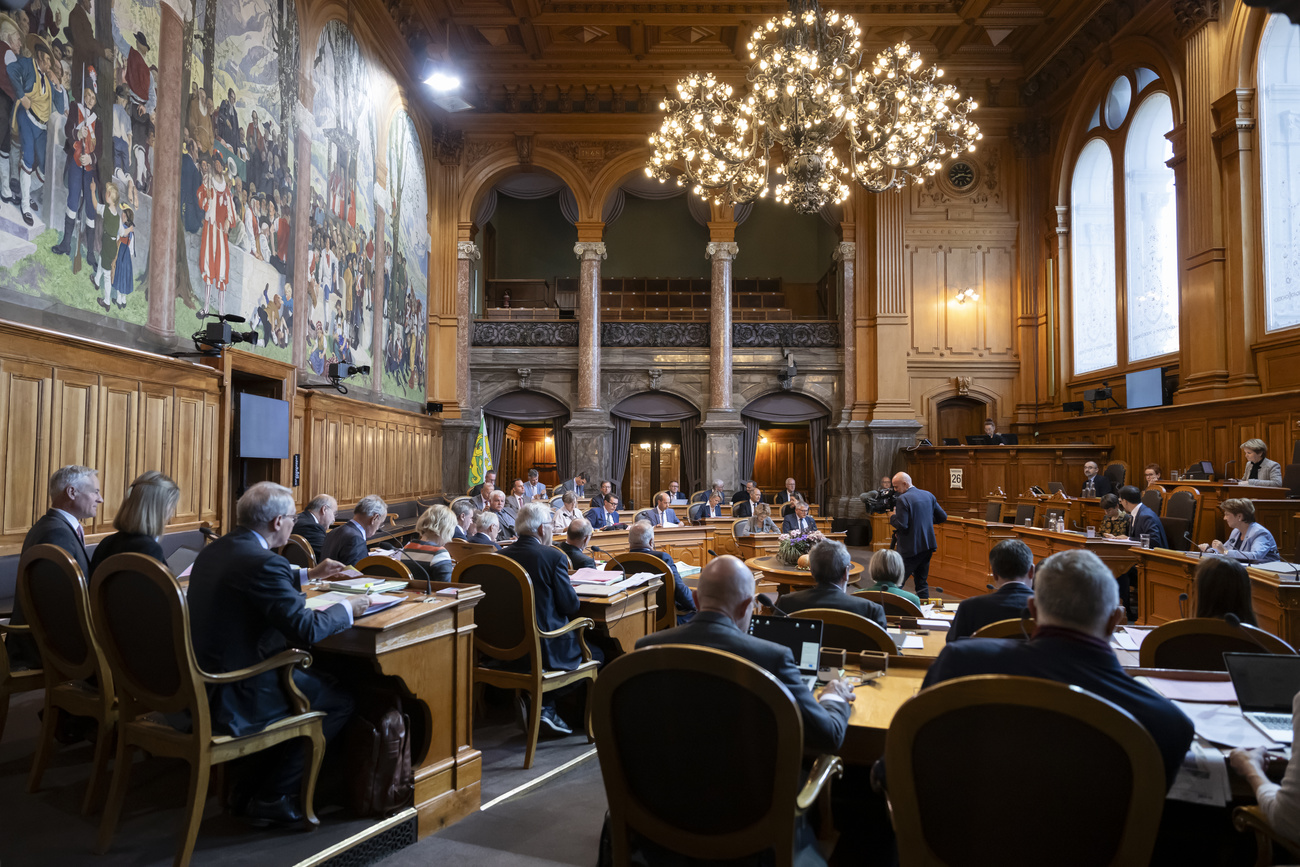
What the winter session of parliament holds for the Swiss Abroad

The winter session of the Swiss parliament, which begins on December 4, will cover several topics that affect the Swiss Abroad directly. These include inheritance law in Europe and disagreements over Swiss foreign policy.
For many Swiss citizens living abroad, the amendment to the Federal Act on Private International LawExternal link will have positive consequences. These include greater clarity in cross-border inheritance cases. The amendment will be a further adaptation to European Union law, but the devil will be in the details.
Taking the example of a Swiss citizen who has settled in France and later dies there, if they have assets in both countries, the current law could complicate the inheritance process. Although their testament may be written according to Swiss law, French authorities could declare jurisdiction over their assets. In the worst case, this could result in conflicting decisions.
“In such cases there is a danger that authorities in both states become involved in the same process,” explained Karin Keller-Sutter, Swiss finance minister, when she spoke about the amendment in parliament.
The Federal Council wants to keep such conflicts with European Union states to a minimum. For the 450,000 Swiss citizens who reside in the EU, this will increase their legal and planning security. There is a definite need for such action. “Our society is becoming more mobile. More and more people spend part of their lives abroad,” added Keller-Sutter.
Tricky questions
In the winter session of parliament, which begins on December 4, this legal reform will be finalised. Both parliamentary chambers will work on settling their differences.
However, tricky questions remain regarding the rights of ordinary Swiss citizens versus those with dual citizenship. In cases of cross-border inheritance, dual citizens clearly have more options. The Senate sees this as an advantage that threatens equal rights. It argues that dual citizens who have this choice should systematically have to choose Swiss law. The House of Representatives blocked this move. Both chambers are now trying to reach a compromise. It should not be forgotten, however, that three-quarters of all Swiss Abroad are dual citizens.
A similar, more specific, pending motion addresses the injustice of cross-border inheritances between France and Switzerland, which sometimes leads to double taxation. In the motionExternal link, which the House of Representatives has already accepted, Vincent Maitre of The Centre Party demands that this issue with France be negotiated away. The proposal is not yet on the agenda.
Parliament intervenes
In another initiative, soon to be finalised, parliament is calling for more control and involvement in the Swiss-European Union dossier. The issue here is that Swiss foreign policy is controlled by the government, which means parliament is always excluded; this includes the current talks between Bern and Brussels. The House of Representatives Foreign Affairs Committee now wants some kind of say over the existing programmes funded by the federal government.
Here, it refers to the EU’s Horizon Europe research funding scheme or the Erasmus+ mobility and education programme, but also film promotion. The motion has broad support from 44 co-signatories. It has been endorsed by the Federal Council and adopted by the House of Representatives. The support of the Senate is still lacking; it will take a decision on December 12.
A focus on foreign policy
Essentially, Swiss parliamentarians would like to get more involved in foreign policy issues. They have been making new proposals at almost every parliamentary session. The more complicated the world’s crises become, the more exposed Switzerland’s economic relations appear to be – whether with China, Russia or Iran. And that in turn generates concern among Swiss politicians.
The current focus is on control and transparency at the beginning of a process, when Switzerland initiates, negotiates or concludes agreements with other countries. But the overall aim is much more fundamental. The House of Representatives Foreign Affairs Committee is preparing an extensive revision of Swiss foreign trade policyExternal link – greater transparency, more risk management, and more democracy.
If this is implemented, the Federal Council and the foreign ministry would no longer be able to form trade relationships alone, but only in close collaboration with parliament. There would also be the possibility of holding referendums. “A comprehensive foreign trade law should create a solid legal basis for Switzerland’s foreign trade policy,” the related postulate states. But first the Federal Council should examine the idea and outline its position.
Dispute over Taiwan
Finally, there is an interesting motion concerning Taiwan. In May, the House of Representatives decided that it wanted to work more closely with Taiwan’s parliament. This was a political gesture of Swiss support for Taiwanese democracy, which is under pressure from China, without Switzerland officially exposing itself.

The catch is that Switzerland has two parliamentary chambers, while Taiwan has only one. A motion put forward by the right-wing Swiss People’s Party in the Senate now aims to rein in the House of Representatives and avoid a “misleading message”. One chamber alone cannot establish relations with another parliament, says the People’s Party. If the motion passes, China will be pleased.
Agreements signed between Switzerland and South KoreaExternal link (free trade), IndonesiaExternal link (capital investment) and the United Arab EmiratesExternal link (double taxation) are also due to be discussed during the upcoming winter session.
Federal Council avoids questions
Before the beginning of the new legislature, the Federal Council replied to three motions that directly affect the Swiss Abroad. Representatives of the centrist Liberal Green Party had submitted them shortly before the end of the previous legislature. They are not yet on the agenda, but the answers of the Federal Council are revealing.
The first is a question on the issue of pension gapsExternal link, which can occur when a Swiss citizen is employed abroad for part of their working life. House of Representatives parliamentarian Melanie Mettler argues that the second (occupational) pillar of the Swiss pension system is particularly confusing. “A return to Switzerland must guarantee secure retirement provision,” says Mettler.
In its reply, the Federal Council partly agreed with her. “Because of wage differences, the total pension amounts paid to people who worked abroad are usually lower than those of people who worked only in Switzerland,” it stated. However, the government argued that this applies only to the first pillar of the Swiss pension system, the compulsory old-age and survivors’ insurance, which Mettler views as much less of a problem.
In the end, the government rejected the idea, stating that no action was required. The justification is striking. “It is not the task of Swiss pension funds to guarantee the same level of pension to people who worked abroad as they do to people who only worked in Switzerland,” the government said.
Another motion calls for Switzerland to recognise the French Civil Solidarity Pact (PACS). This is a legally registered partnership, more binding than cohabitation, but less binding than marriage. In France it as common as marriage, but it is not recognised in Switzerland. For the 200,000 Swiss citizens who live in France, this can lead to legal insecurities.
The government replied that the Senate is currently working on a legal framework that aims to introduce a civil solidarity pact into Swiss law. “This framework will also examine the recognition and impact of foreign civil solidarity pacts,” it said.
An additional InterpellationExternal link requested information on the roll-out plans for the Swiss e-voting pilot project. The Federal Council said this is a cantonal decision. In fact, in late November Graubünden became the fourth Swiss canton to join the e-voting trial group.
Translated from German by Sue Brönnimann

In compliance with the JTI standards
More: SWI swissinfo.ch certified by the Journalism Trust Initiative
































You can find an overview of ongoing debates with our journalists here . Please join us!
If you want to start a conversation about a topic raised in this article or want to report factual errors, email us at english@swissinfo.ch.